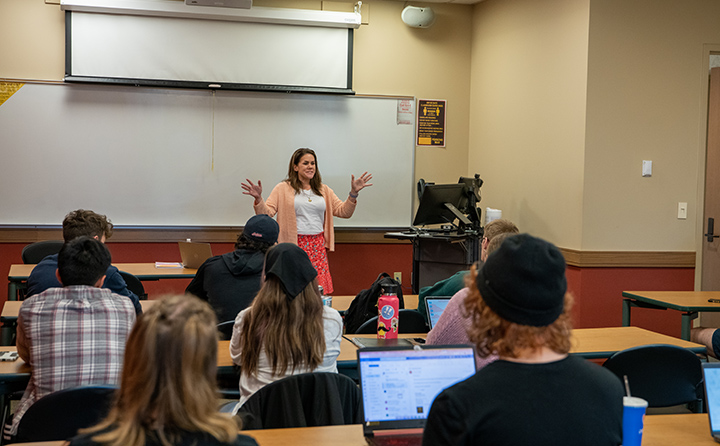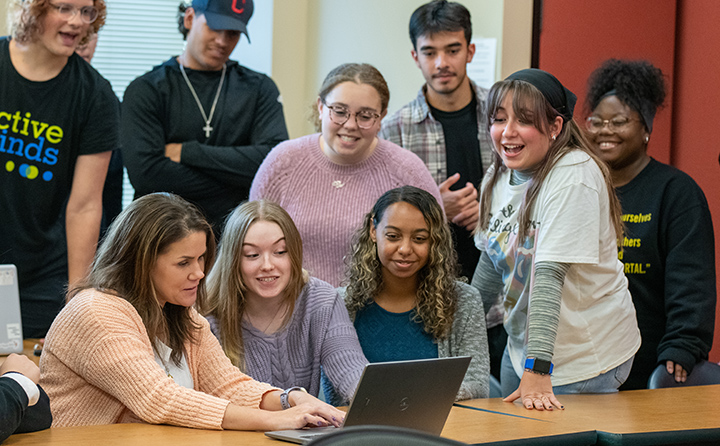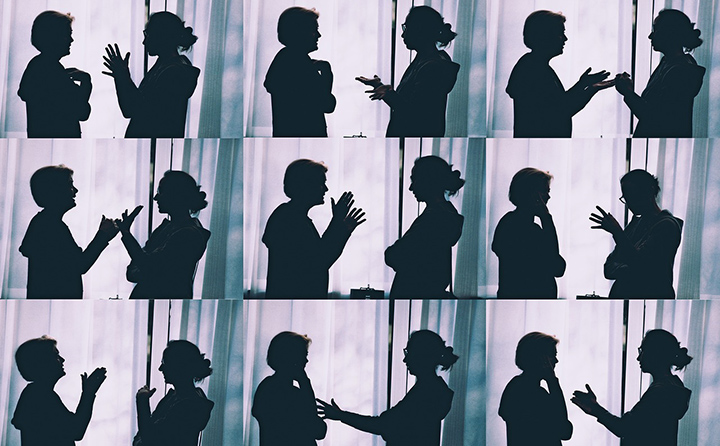With a goal of cultivating respectful dialogue in the classroom and beyond, a BW political science professor is leading a new Democracy and Civility Initiative.

"It often feels as though we are walking on eggshells," says Baldwin Wallace University political science professor Dr. Lauren Copeland.
"Political and affective polarization in the U.S. have made it exceedingly difficult for students to engage in constructive conversations with people who have different political views, and our efforts to engage them often result in silence."
Data backs up that frustrating experience. The Pew Research Center found that partisans view people in the opposing party as closed-minded, dishonest, immoral, lazy and less intelligent. Americans also believe that political debate in the U.S. has become less respectful, less fact-based and less focused on issues.
Copeland has been looking for ways to address the challenge head-on.
As associate director of BW's Community Research Institute (CRI), she established a partnership with cleveland.com/The Plain Dealer and Braver Angels Ohio, which are also exploring ways to "reduce affective polarization."
Students in BW's Department of Politics and Global Citizenship's capstone research course are working with the partners to survey cleveland.com readers on their attitudes toward civility and democracy.
In a deeply reported column on cleveland.com and the front page of Sunday's Plain Dealer by editor Chris Quinn, Copeland and her students shared their thoughts on the civility and democracy project, while Quinn encouraged readers to take the survey.

Some BW students may already be ahead of the civility curve.
Last summer, Copeland designed a workshop, "Getting to Know Each Other: The path to constructive dialogue," aimed at "teaching empathy, or the ability to understand other people's perspectives."
She rolled it out to students in two fall courses, and the framework was picked up and expanded this semester by fellow BW political science professor Dr. Barbara Palmer. "After the workshop, the change was immediate. Students have developed deep connections with each other," Palmer observes.
"We want to hear from conservative, liberal and moderate voices in our classrooms," Copeland adds. "To do so, we need to teach students how to engage in reflective listening, or listening to understand, not to argue."
Copeland's students described for Quinn a classroom discussion on gun control. Bryce Cooney '24 recalled, "We talked about it the whole class, and there wasn't really any animosity."
Chris Moran '24 came away with a new perspective.
"I'm from a more suburban area, and then some people are from more rural parts, like southern Ohio. And we had completely different experiences growing up … So they prioritized other things, had different ideas. I just find it really interesting to hear those ideas … I still believe what I believe, but I can see where you're coming from now, at least, from listening and hearing more."
Liana Gonzalez '24 expressed hope. "We have to have some sort of faith that we will be able to sit down and have conversations like this in our government system … That's what our whole system is built on - being able to compromise with other parties."
With robust student and faculty involvement, the vision for the Democracy and Civility Initiative is just starting to take shape.
Two students have applied to work on the initiative as BW Summer Scholars.
Faculty colleague Dr. Matthew Ward is interested in creating workshops to teach people how to advocate for themselves in our political system as well as creating opportunities for students to engage in collaborative research projects.

Copeland says the idea is to develop activities that can teach faculty, staff, students and community members how to, among other things,
"This initiative would also serve as an umbrella organization to build interdisciplinary connections and create synergy around work that is already being done on campus in the Brain Center, Center for Inclusion, Faith and Life, and others," Copeland says.
"The idea is in its infancy, but we envision a powerful resource for BW and all of Northeast Ohio."